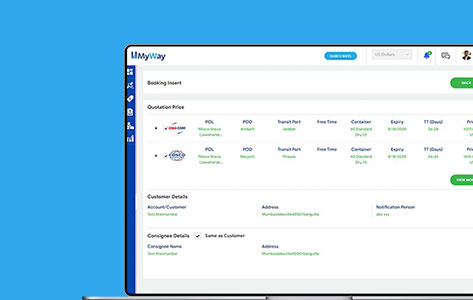Demand is extremely high today, thanks to solid consumer spending and steady economic growth. However, as consumer preferences continue to evolve at a rapid pace, it is becoming more difficult to maintain regulation. 71% of customers increasingly demand a wider selection of products.
Customers, in other words, are rapidly devolving into hyper-local segments of one, each with their own set of requirements, habits, desires, and digital transformation journeys. And because each of these segments is critical to incremental development, they must not be overlooked.
Shipping companies are working hard to keep up with the pressure. However, they continue to run into familiar roadblocks in the form of current networks, distribution structures, skills, and organizational structure, all of which are built on the "old" consumer expectation of excellence. The "fresh" standards, which are a symptom of today's multichannel, digital environment, are putting a strain on networks that were designed to be hyper-productive in what was previously a brick-and-mortar world.
Worse, current consumer demand exceeds the availability of resources available to meet it, resulting in skyrocketing logistics costs. Shippers have attempted to strengthen their activities with strategic sessions and other small changes.

Making more drastic changes, on the other hand, is analogous to converting operational battleships to jet skis—an initiative hampered by disparate systems that aren't synchronized through the supply chain, a lack of operational visibility due to organizational silos, and shortcomings in technology and skills required to drive the change. Transforming the battleship takes a lot of effort and money, not to mention time—which shippers today simply don’t have.
3PL Logistics
Third party logistics, or 3PL, emerges when a first party in the shipping chain, the 1PL, hires a firm to handle the services of the 2PL. The third-party logistics manager provides the supply chain with a number of high-level facilities that set it apart from the lower-level participants.
Transportation, warehousing, inventory control, storage, cross-docking, and freight forwarding are only a few of the services provided by a 3PL logistics business. The 3PL logistics company must consult with the customer to ensure that the logistic approach is compatible with the 1PL provider's business plan and strategy.
4PL Logistics
Since much of what a 3PL logistics solutions and a fourth party logistics services provider do is identical, it can be difficult to tell them apart. Essentially, a 4PL provider serves as the manager of a network of 3PLs. It is a self-contained organization with no assets that serves as the customer's primary point of contact while also coordinating the various 3PL companies in the chain.
In general, the 4LP establishes a higher degree of control over the supply chain process and is viewed as a higher-level consultant when making decisions about aspects of the shipping activity such as storage, routes, modes of transportation, and logistics.
5PL Logistics
With the introduction of technology and digitalization into shipping logistics, 5th party logistics service companies play an increasingly important role in designing, coordinating, and implementing technology-based solutions on behalf of multiple clients.
The 5PL firms are working to create a fluid relationship between all 3PL and 4PL firms that may be involved in a shipping transaction. The 5PL companies typically incorporate the needs and demands of the 3PL providers into a bulk volume of services in order to have a better shipping rate.
XPL is a key element of future logistics operation
XPL has the potential to act as a broker for this new digitally oriented, highly collaborative way of serving customers. It has the ability to link the dots across the logistics network, designing and orchestrating an end-to-end solution that brings together the appropriate suppliers and resources needed to deliver highly customized service at a cost-effective level down to the individual customer level.
XPL is the latest organizational mentality needed for businesses to succeed in today's age of constant change. In Industry X.0, the letter “X” denotes that transition is no longer linear, and businesses can determine the most successful combination of emerging technology and processes to drive their digital transformation.

Similarly, the "X" in XPL denotes that the next move beyond 3PLs isn't a linear, incremental change in logistics (4PL), but an x-factor-level of change, fueled by new capabilities and technologies, that supports the broader company's reinvention.
Executing XPL ecosystem while balancing demand and supply
In an XPL environment, orchestrating the ecosystem in concert with suppliers and customers is another major challenge for shippers. To make fulfillment more sensitive, this necessitates providing broad, real-time insight into both supply and demand, as well as the ability to forecast and sense innovations and trends.
In other words, shippers need more intelligent operations that enable them to understand and respond to what is happening across their logistics network and ecosystem.
Intelligent operations can help shippers accomplish three critical objectives:
- Avoid cost increases that aren't anticipated, particularly during periods of high demand or capacity constraints.
- Continuously improve operations to strengthen cost control and improve overall efficiency.
- Plan ahead of time to prevent network outages that are expensive.
For example, a shipper with intelligent operations may anticipate the effect of a price change or offer on-demand and ensure that the right products are delivered to the right location to satisfy the demand.
It can constantly model shipping capacity against current and expected demand to forecast and correct possible imbalances, which is particularly important for inbound imported goods that have long lead times. It can also mobilize the most suitable suppliers to meet the particular needs and demands of specific customers, as well as set up a long-term freight diversion to avoid disruptions that could affect shipments (such as natural disasters, weather conditions, an impending labor strike.
Applied intelligence, broadly speaking, extends human reasoning, processing, and decision-making capabilities, and is driven by a number of key technologies:
Advanced analytics
Shippers can use advanced analytics tools to predict what will happen based on multiple data inputs and produce actionable recommendations in the areas of cost, operation, and revenue. Analytics can continually learn and adapt to evolving circumstances when augmented with advanced machine learning and cognitive computing.
Automation technologies
Automation technology can help logistics operations become more efficient and flexible, which is critical for keeping up with the rate at which demand and supply shift. One 3PL, for example, employs robotic process automation (RPA) as a customer service agent to manage email requests for shipment pickup.
The software robot extracts the necessary data from the email, schedules the pick-up, and then notifies the customer and carrier of the pick-up information. Instead of taking hours, the whole procedure takes seconds. Other businesses are implementing AI to perform increasingly complex tasks.
One of the most exciting new applications of AI in logistics, according to DHL, is “anticipatory logistics.” Before any orders are placed, an AI tool forecasts demand, allowing a company to plan for shipments ahead of time— and therefore reduce delivery time.
Blockchain
While still in its infancy, blockchain is rapidly maturing and will soon play a significant role in intelligent logistics operations. It will ultimately serve as the basis for facilitating safe transactions across the supply chain and among all ecosystem parties.
Participants in the freight industry have come together to boost blockchain standards and education thanks to blockchain. By removing paperwork and duplicate transactions, creating "smart contracts," and providing a single system of record for all parties involved, blockchain has the potential to transform and simplify the entire supply chain process.
A True Logistics Transformation
The evolving concept of XPL serves as a link between the rigid logistics networks of the past and the flexible and sensitive networks that are needed to succeed today and in the future.
Shippers will start building an ecosystem of creative capabilities and innovations with XPL to help them develop intelligent logistics operations to most efficiently and effectively sync supply and demand—whether in a consumer goods environment or some other form of business with physical goods and demanding, often unpredictable customers.
Shippers may use XPL to control logistics costs, boost logistics efficiency, and prevent network disruptions. Shippers will also benefit from XPL right away by working with an XPL services provider rather than investing time and resources in developing XPL capabilities themselves. XPL can help shippers transform how they move goods to keep pace with customer expectations while proactively managing logistics costs.
How to decide which PL service is best for you?
Choosing the best logistics service provider can be a difficult task for businesses. Brainvire has vast experience in providing consultations for your business so that you can find the right logistics provider for your business. However, don't rush the process because your company's credibility and performance will soon be dependent on the efficiency of your logistics provider.

Use these 5 criteria to choose the ideal logistics company and avoid a logistical nightmare.
1. Capabilities
A potential logistics provider must be knowledgeable in the particular service areas that your business requires. It's not a given that a provider would be able to serve your company properly just because they're a rock star in one region.
They should also possess a range of skills that can meet both your immediate and long-term needs.
2. Customer Service
Almost every company claims to provide outstanding customer service, but you can never be sure. You inquire of their clients. Request referrals from businesses that are in related sectors and have similar needs. It is not by chance that you have excellent customer service. If customer service is consistently good, it's most likely the outcome of a well-documented and repeated process that will be carried out over time.
Safety is another benefit of successful process execution. It's unusual for a logistics company to have outstanding customer service but bad safety performance, or vice versa. A reliable logistics company is likely to have excellent customer support.
3. Safety Record
Because of the ever-changing environment of safety legislation, you must choose a carrier with a proven track record of safety. The public can see a list of safety scores and figures here.
4. Company Stability
Choose a logistics supplier with overall company stability, whether the supply chain is easy or complicated. Suppliers that are at the top of their game are reliable. As businesses undergo rapid change, quality can be jeopardized.
Furthermore, if a single high-reliability incident happens and the provider is unable to handle the consequences, the responsibility always transfers to you, the shipper. If the provider's "term," brand, and credibility have remained intact through decades of market turmoil and economic instability, this issue can be alleviated.
5. Company Reputation
In a new business partnership, you can be sure that the relationship will be put to the test at some stage. The character of the service provider's leadership is often exposed at this stage.
Until it is too late, investigate whether the provider is willing to respond with dignity and honor.
These are just a few points you need to consider while finding the appropriate logistics provider according to your business needs. Whether you are a logistics provider yourself, Brainvire can assist you in creating your own customized logistics management software to manage your fleet and cargo movement.
With our tailored logistics management solutions, businesses and logistics providers can manage their eCommerce and shipping seamlessly. We will help you integrate your logistics software with your ERP and eCommerce channel to provide end-to-end support and updates.
Conclusion
Choosing a logistics solution is one step toward streamlining the entire logistics and supply chain operations cycle. A custom logistics management solution that can meet each provider's demands is needed for effective management of each process from procurement to delivery. For instance, an organization lacking an in-house logistics department needs a software management tool that can wrap around their existing methodology and improve it.
Businesses may deploy logistics management software that is customized to their needs through collaborating with a software development provider. Brainvire, a pioneer in custom software creation, will help businesses ranging from wholesalers to distributors to e-commerce with custom logistic solutions and designing digital transformation journeys that will help businesses ranging from wholesalers to distributors to e-commerce with custom logistic solutions.
Related Articles
Digital Transformation
AI in Action: Revolutionizing Content Management and Delivery with Adobe Experience Manager Assets
Digital Transformation
Beyond the Launchpad: Why Dedicated Post-Migration Support is Your Shopify Success Secret Weapon
Digital Transformation
Orchestrating Seamless Customer Journeys: The Power of Adobe Journey Optimizer (AJO) in Real-Time


